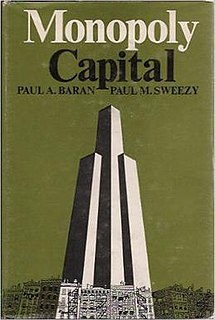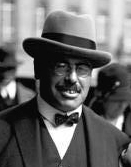State capitalism is an economic system in which the state undertakes business and commercial economic activity and where the means of production are organized and managed as state-owned enterprises, or where there is otherwise a dominance of corporatized government agencies or of public companies such as publicly listed corporations in which the state has controlling shares. Marxist literature defines state capitalism as a social system combining capitalism with ownership or control by a state. By this definition, a state capitalist country is one where the government controls the economy and essentially acts like a single huge corporation, extracting the surplus value from the workforce in order to invest it in further production. This designation applies regardless of the political aims of the state. Many scholars argue that the economy of the Soviet Union and of the Eastern Bloc countries modeled after it, including Maoist China, were state capitalist systems. They also argue that the current economy of China constitutes a form of state capitalism.
Late capitalism, or late-stage capitalism, is a term first used in print by German economist Werner Sombart around the turn of the 20th century. Since 2016, the term has been used in the United States and Canada to refer to perceived absurdities, contradictions, crises, injustices, and inequality created by modern business development.

Finance capitalism or financial capitalism is the subordination of processes of production to the accumulation of money profits in a financial system.

John Atkinson Hobson was an English economist and social scientist. Hobson is best known for his writing on imperialism, which influenced Vladimir Lenin, and his theory of underconsumption.
Paul Marlor Sweezy was a Marxist economist, political activist, publisher, and founding editor of the long-running magazine Monthly Review. He is best remembered for his contributions to economic theory as one of the leading Marxian economists of the second half of the 20th century.

The theory of state monopoly capitalism was initially a Marxist thesis popularised after World War II. Lenin had claimed in 1916 that World War I had transformed laissez-faire capitalism into monopoly capitalism, but he did not publish any extensive theory about the topic. The term refers to an environment where the state intervenes in the economy to protect larger monopolistic or oligopolistic businesses from threats. As conceived by Lenin in his pamphlet of the same name the theory aims to describe the final historical stage of capitalism, of which he believed the Imperialism of that time to be the highest expression.

Samir Amin was an Egyptian-French Marxian economist, political scientist and world-systems analyst. He is noted for his introduction of the term Eurocentrism in 1988 and considered a pioneer of Dependency Theory.

Imperialism: A Study (1902), by John A. Hobson, is a politico–economic discourse about the negative financial, economic, and moral aspects of imperialism as a nationalistic business enterprise.
The history of capitalism is diverse and has many debated roots, but fully fledged capitalism is generally thought by scholars to have emerged in Northwestern Europe, especially in Great Britain and the Netherlands, in the 16th to 17th centuries. Over the following centuries, capital accumulated by a variety of methods, in a variety of scales, and associated with much variation in the concentration of wealth and economic power. Capitalism gradually became the dominant economic system throughout the world. Much of the history of the past 500 years is concerned with the development of capitalism in its various forms.

John Bellamy Foster is an American professor of sociology at the University of Oregon and also editor of Monthly Review. He writes about political economy of capitalism and economic crisis, ecology and ecological crisis, and Marxist theory. He has given numerous interviews, talks, and invited lectures, as well as written invited commentary, articles, and books on the subject.

Monopoly Capital: An Essay on the American Economic and Social Order is a 1966 book by the Marxian economists Paul Sweezy and Paul A. Baran. It was published by Monthly Review Press. It made a major contribution to Marxian theory by shifting attention from the assumption of a competitive economy to the monopolistic economy associated with the giant corporations that dominate the modern accumulation process. Their work played a leading role in the intellectual development of the New Left in the 1960s and 1970s. As a review in the American Economic Review stated, it represented "the first serious attempt to extend Marx’s model of competitive capitalism to the new conditions of monopoly capitalism." It attracted renewed attention following the Great Recession.
The ideology of the Communist Party of the Soviet Union (CPSU) was Marxism–Leninism, an ideology of a centralised command economy with a vanguardist one-party state to realise the dictatorship of the proletariat. The Soviet Union's ideological commitment to achieving communism included the development of socialism in one country and peaceful coexistence with capitalist countries while engaging in anti-imperialism to defend the international proletariat, combat capitalism and promote the goals of communism. The state ideology of the Soviet Union—and thus Marxism–Leninism—derived and developed from the theories, policies and political praxis of Lenin and Stalin.
Uneven and combined development is a concept in Marxian political economy intended to describe dynamics of human history involving the interaction of capitalist laws of motion and starting world market conditions whose national units are highly heterogeneous.

The Theory of Capitalist Development is a 1942 book by the Marxian economist Paul Sweezy, in which the author expounds and defends the labor theory of value. It has received praise as an important work, but Sweezy has also been criticized for misrepresenting Karl Marx's economic theories.

Rudolf Hilferding was an Austrian-born Marxist economist, leading socialist theorist, politician and chief theoretician for the Social Democratic Party of Germany (SPD) during the Weimar Republic. He is almost universally recognized as the SPD's foremost theoretician of his century, and a physician.

Imperialism, the Highest Stage of Capitalism (1917), by Vladimir Lenin, describes the function of financial capital in generating profits from imperialist colonialism as the final stage of capitalist development to ensure greater profits. The essay is a synthesis of Lenin's modifications and developments of economic theories that Karl Marx formulated in Das Kapital (1867).

Mahir Çayan was a Turkish communist revolutionary and the leader of People's Liberation Party-Front of Turkey. He was a Marxist–Leninist revolutionary leader. On 30 March 1972, he was killed in an ambush by Turkish Military Forces with nine of the other members of THKP-C and THKO in Kızıldere village.
Anti-imperialism in political science and international relations is a term used in a variety of contexts, usually by nationalist movements who want to secede from a larger polity or as a specific theory opposed to capitalism in Marxist–Leninist discourse, derived from Vladimir Lenin's work Imperialism, the Highest Stage of Capitalism. A less common usage is by supporters of a non-interventionist foreign policy.
Within Marxist theory, modern warfare is described as existing as result of capitalism. Marxist theory states that all modern wars are caused by competition for resources and markets between great and imperialist powers, claiming these wars are a natural result of the free market and a class system.
Theory of Imperialism concerns the global systemic outcomes of the tendency for the rate of profit to fall in the capitalist system, and the objective impact of the consequences of those dynamics, and counter-tendencies in the world economy which are now generally associated with Marxian economics. As such it is often considered distinct and differentiated from the history of imperialism that extends through earlier historic periods and economic formations. J. A. Hobson's liberal critique of the emerging phenomenon has been considered as seminal by many writers on the subject, preceding and influencing Hilferding, Lenin "the principal English work on imperialism" and Luxemburg's formulations and teaching. However recent scholarship has unearthed and documented the preceding debates about imperialism that led up to World War I.











